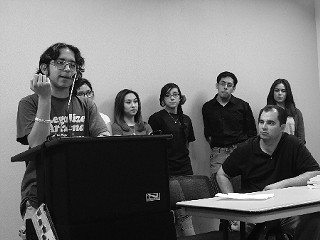Several days after the Tucson Unified School District's governing board voted on Jan. 10 to dismantle its Mexican-American studies classes, a confusing picture emerged from teachers and supporters.
Chicano-literature teacher Curtis Acosta—a finalist for the UA Circle K Teacher of the Year award—talked about how the changes were affecting his classes, his students and how he teaches at Tucson High Magnet School.
"We're filled with the vagueness that the law is founded upon," Acosta said. "No one knows what to tell us definitively."
Acosta was told to switch his junior and senior level classes from Chicano literature to English literature, and that he can no longer teach from books like Luis Alberto Urrea's novel The Devil's Highway; Bless Me, Ultima by Rudolfo Anaya; or Mexican WhiteBoy by Matt de la Peña.
However, teachers who were not under the MAS banner can teach apparently from any of the books banned from TUSD's former MAS classrooms.
Acosta was a literature teacher at University High School before he left to teach Chicano literature at Tucson High. At UHS, he taught Shakespeare's The Tempest from a historical context, which includes looking at issues such as slavery, race and oppression.
In a discussion with his department head and principal, Acosta said it was determined that it is best to stay away from The Tempest. Acosta figured if this classic play is off-limits for those reasons, then works like Huckleberry Finn are probably off-limits, too.
Acosta said he's scrambling to put together a curriculum that will need to be approved by his supervisors. Beyond what he teaches, he wonders about his students who've been in his classes since August: What if they bring up the topics Acosta is no longer allowed to teach?
"We're all ignorant on how we're supposed to move forward. No one has answers," Acosta said.
TUSD Deputy Superintendent Maria Menconi told the Weekly on Friday, Jan. 13, that she's not surprised by former MAS teachers' frustrations. "It's going to take awhile. It's a messy process," she said.
When asked if books like The Tempest have been banned from TUSD, she said she feels that the book can still be taught, and that the issues Acosta wants to teach can be discussed in his classroom. "I get this is very, very personal, and that it hurts," she said. "We have an obligation to carry out the order."
Responding to an email for additional information, TUSD Superintendent John Pedicone referred calls to Menconi, but also wrote back: "Also, please know that we are not banning books in the district—we have met the requirement of the law and removed the books from the classrooms (unfortunately while students were present—not what we expected), and those are stored with other books in our depository. Any other books in the places where they were located remain in place."
At a community forum on Saturday, Jan. 14, supporters of Mexican-American studies heard from TUSD board member Adelita Grijalva regarding discussions that took place during the Jan. 10 board meeting. Grijalva, the only board member to vote against ending the classes, said that when board members discussed next steps, she asked what was going to happen in the classrooms and with MAS instructional materials. The answer was, "We're not really sure."
The road map to ending the program—which, according to the district's own court-ordered desegregation plan, should be expanded—is to use the final rulings by Superintendent of Public Instruction John Huppenthal, as well as the state administrative judge who upheld Huppenthal's ruling that the classes violated state law, as the guide.
Grijalva said anything highlighted by the administration in a copy of the ruling and referenced by Huppenthal was expected to be changed and taken out of the classrooms.
The first book she saw highlighted was 500 Years of Chicano History in Pictures.
"You know, that's not an interpretation; it's a picture. For me, I sat there in awe and looked out at my fellow board members and superintendent and said, 'This is the road we want to take? Are you sure you want do this, because we are banning books in this district—and not anything controversial? We're banning pictures.'" Grijalva said.
"... I couldn't believe I was sitting there with so-called educated people willing to go down this road ... but I am looking forward, because three of these (board members) are up for re-election at the end of this year."
Grijalva said the district had the option to appeal in Superior Court and ask for a "stay of the fine" that was being levied by Huppenthal. The board was told that an appeal would cost the district $50,000.
Grijalva said she was amazed that board president Mark Stegeman and clerk of the board Michael Hicks said the cost was one reason they didn't want to appeal—yet last year, they tried to push for a TUSD special election to replace the late Judy Burns.
"They were willing to move forward on (almost) $1 million for a special election to have a board member sit on our seat from May to December. To me, that's crazy. That was something that they were willing to do. That again speaks to the willingness and their desire (to get rid of these classes)," Grijalva said.
(Stegeman told the Tucson Weekly via email that he "always felt that an election was a bad idea, because of the cost," and that he didn't think the cost of an ethnic-studies appeal was prohibitive. "I have simply said that it was a bad idea, and cost is only one of the reasons.")
Grijalva and others at the forum, including Tucson attorney Richard Martinez—who is representing students and teachers in a federal lawsuit that seeks to get rid of the state law—spoke about the need for a three-person slate of candidates to run against Stegeman, Miguel Cuevas and newly appointed board member Alexandre Sugiyama, who took Burns' seat. All are up for election this year.
During the Jan. 14 community forum, three people introduced themselves as candidates—Miguel Ortega, who lost during the last school board election; Sunnyside School District teacher Kristel Foster; and TUSD parent Betts Putnam-Hidalgo.
Grijalva told the community to take advantage of the national attention being given to the ethnic-studies decision to push for an appeal and new school board members.
"It's not going to go away. ... That was the hope of some of the board members on Tuesday (Jan. 10)," Grijalva said.













